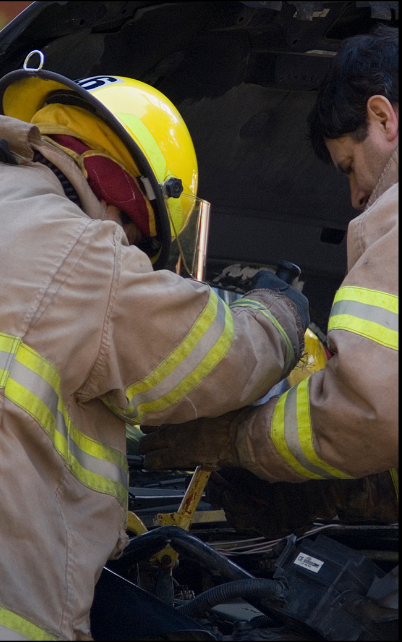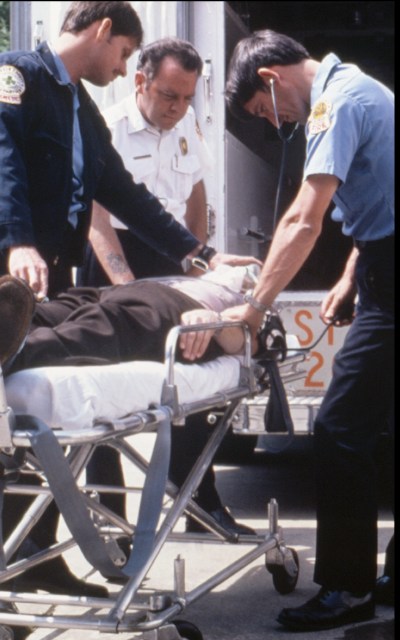
You are not defined by an incident.
Reactions to traumatic events vary from person to person and event to event. Two people can go on the same call and perceive it completely differently. Continuous exposure to trauma can begin to overwhelm or compromise your ability to cope effectively. You don't have to suffer in silence.
Reaching out for help is not a deficiency in you or a sign of weakness. Support is available. We care about you and will help you work through it.
Discussing it with trained peers can help improve your professional and personal life by providing healthy coping mechanisms to reduce the stress surrounding your circumstances. We'll help you navigate through it.
Don't let stigma be a barrier to seeking help. It's okay to talk to someone about your experience.

What is a Critical Incident?
A Critical Incident is defined as "Any event that is out of the range of normal experience, one that is sudden and unexpected, makes one lose control, involves the perception of a threat to life, and can include elements of physical or emotional loss."
It is normal and common to experience strong physical, cognitive, emotional, behavioral, or spiritual reactions following a critical incident. Your reactions to abnormal events can overwhelm your natural ability to cope.
Your reactions are normal to an abnormal event.
Examples of incidents in which the Peer Support Team may be activated:
-
Use of deadly force
-
Line of duty death
-
Serious line-of-duty injury and off-duty events
-
Mass casualty response
-
Prolonged event of a highly stressful or dangerous nature
-
Serious injury/death of a child
-
High-profile or emotionally charged event
-
Suicide of a co-worker
-
First responder's relationship with the victim
Don't suffer in silence.
You are not alone.




Why Use Peer Support?
When a person has been involved in a critical event, it’s not unusual for them to experience intrusive thoughts and dreams, different moods, uncharacteristic emotions, loss of energy, and minor or delayed shock. These are normal thoughts and feelings that normal people experience when exposed to an abnormal event.
Studies show that when a person has been through a critical incident, they tend to have a better post-incident return to normalcy when they discuss the event with a support person. Often, this interaction can prevent a person from seeking further mental health support.
Peer Support provides an outlet for those involved to share their experiences and reactions to the event, express thoughts and concerns since the event, and receive guidance on what one can do to feel better and return to pre-incident functionality if troubled.
Our team is committed to helping you process the event, answer questions, provide assistance, and lend support. Everything shared should be considered confidential. Our team does not report the interaction or conversation.
Our Mission
The Warren County Peer Support Team exists to help keep you and your agency in optimal health and performance.
Our team acts when called upon, anytime and anywhere, in the county.
We listen, we respond, and we refer to vetted resources when necessary.
Peer support is available to law enforcement, fire, EMS, communication specialists, military, education community, hospitals, critical care providers, charitable organizations, and other care providers across Warren County.

Your Peers. Compassionate. Dedicated. Trusted.




















Providing peer support to first responders in need.
Taking Care of Yourself
When there is an emergency, we all count on someone being there to respond to the call for help. These events not only impact the community but also profoundly impact the first responders who respond to the calls for help. First responders focus on taking care of others, often at the expense of their own self-care. As a result, first responders face an increased risk of experiencing behavioral health issues, including mental illness and substance abuse disorders.
Peer Support is part of an overall wellness strategy that is designed to help first responders stay in the fight emotionally, psychologically, and spiritually. The team strives to help mitigate the risks of burnout, vicarious trauma, and moral injury from their profession's day-to-day activities and events.
First responders provide the best care in a critical situation when responding to those in:
-
a mental health crisis when they are taking care of their own mental health,
-
a physical crisis when they are physically at their optimal health,
-
traumatic circumstances when they are spiritually experiencing love, empathy, peace, sobriety, and purpose through God as their higher power.
KEEP GOING. Remember why you started.
About Us

Critical Incident
Response Service

The Warren County Peer Support Team is a Critical Incident Stress Management Peer Support Team under the Ohio Critical Incident Stress Management Network. We were established on July 1, 2022.
Our team comprises law enforcement, fire, EMS, communications, corrections, clinical, and chaplaincy personnel.
The primary goal of the peer support team is to effectively recognize and respond to another first responder, agency employee, or family member who is experiencing emotional or physical symptoms from exposure to acute or chronic high-stress incidents.
The team works with individuals and groups to prevent or lessen the potential negative impact of stress upon first responders by providing emotional support, information, and assistance after a critical incident. The program provides mental and emotional support through one-on-one discussion, group intervention, education, family support, immediate support, and post-incident follow-up.


















_svg.png)